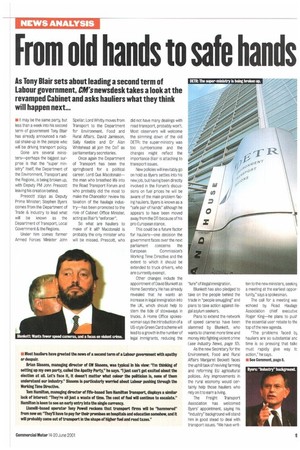From old hands to safe hands
Page 9

If you've noticed an error in this article please click here to report it so we can fix it.
As Tony Blair sets about leading a second term of Labour government, CM'snewsdesk takes a look at the revamped Cabinet and asks hauliers what they think will happen next...
• It may be the same party, but less than a week into his second term of government Tony Blair has already announced a radical shake-up in the people who will be driving transport policy.
Gone are several ministers—perhaps the biggest surprise is that the 'toper ministry" itself, the Department of the Environment, Transport and the Regions, is being broken up, with Deputy PM John Prescott leaving his creation behind.
Prescott stays as Deputy Prime Minister; Stephen Byers comes from the Department of Trade & Industry to lead what will be known as the Department of Transport, Local Government & the Regions.
Under him comes former Armed Forces Minister John Speller. Lord Whitty moves from Transport to the Department for Environment, Food and Rural Affairs. David Jamieson, Sally Keeble and Dr Alan Whitehead all join the DoT as parliamentary secretaries.
Once again the Department of Transport has been the springboard for a political career. Lord Gus Macdonald— the man who breathed life into the Road Transport Forum and who probably did the most to make the Chancellor review his taxation of the haulage industry—has been promoted to the role of Cabinet Office Minister, acting as Blair's 'enforcer".
So what are hauliers to make of it allP Macdonald is probably the only minister who will be missed. Prescott, who did not have many dealings with road transport, probably won't. Most observers will welcome the siimming down of the old DETR: the super-ministry was too cumbersome and the changes might reflect the importance Blair is attaching to transport issues.
New policies will inevitably go on hold as Byers settles into his new job, but having been directly involved in the Forum's discussions on fuel prices he will be aware of the main problem facing hauliers. Byers is known as a "safe pair of hands although he appears to have been moved away from the DTi because of his pro-European stance.
This could be a future factor for hauliers—one decision the government faces over the next parliament concerns the European Commission's Working Time Directive and the extent to which it should be extended to truck drivers, who are currently exempt.
Other changes include the appointment of David Blunkett as Home Secretary. He has already revealed that he wants an increase in legal immigration into the UK, which should help to stem the tide of stowaways in trucks. A Home Office spokeswoman says the introduction of a US-style Green Card scheme will lead to a growth in the number of legal immigrants, reducing the "lure" of illegal immigration.
Blunkett has also pledged to take on the people behind the trade in "people smuggling" and plans to take action against illegal asylum seekers.
Plans to extend the network of speed cameras have been slammed by Blunkett, who wants to channel more time and money into fighting violent crime (see industry News, page 10).
As the new Secretary for the Environment, Food and Rural Affairs Margaret Beckett faces the uphill task of reviving farming and reforming EU agricultural policies. Any improvements in the rural economy would certainly help those hauliers who rely on it to earn a living.
The Freight Transport Association has welcomed Byers' appointment, saying his "industry" background will stand him in good stead to deal with transport issues. "We have writ
ten to the new ministers, seekinE a meeting at the earliest oppor tunity," says a spokesman.
The call for a meeting wan echoed by Road Haulage Association chief executive Roger King—he plans to putt the essential user rebate to the top of the new agenda.
"The problems faced hauliers are so substantial anc time is so pressing that talk, must rapidly give way tc action," he says.
• See Comment, page B.
































































































